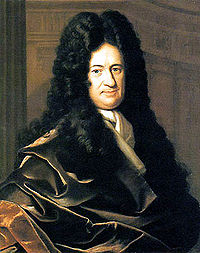Theodicy
| Part of a series on |
| God |
|---|
|
General conceptions Specific conceptions Attributes Experience and practices Related topics Philosophy · Religion · Ontology |
-
- For specific attempted answers to the problem of evil see that article
The term theodicy (pronounced /θiːˈɒdɪsi/) comes from Greek theos ‘god’ + dike ‘justice’.[1]

The term was coined in 1710 by the German philosopher Gottfried Leibniz in a work in French entitled Essais de Théodicée sur la bonté de Dieu, la liberté de l'homme et l'origine du mal ("Theodicy Essays on the Goodness of God, the Freedom of Man and the Origin of Evil").[2]
The purpose of the essay was to show that the evil in the world does not conflict with the goodness of God, and that notwithstanding its many evils, the world is the best of all possible worlds. Leibniz wrote his Théodicée as a criticism of Pierre Bayle's Dictionnaire Historique et Critique, which had been written not long before; in this, Bayle, a well-known skeptic, had argued that the sufferings experienced in this earthly life prove that God could not be good and omnipotent (the problem of evil).
According to the Merriam-Webster Online Dictionary the meaning is "defense of God's goodness and omnipotence in view of the existence of evil". Encyclopedia Britannica gives the meaning as "explanation of why a perfectly good, almighty, and all-knowing God permits evil." Random House Dictionary writes "a vindication of the divine attributes, particularly holiness and justice, in establishing or allowing the existence of physical and moral evil." The American Heritage Dictionary of the English Language, Fourth Edition states "A vindication of God's goodness and justice in the face of the existence of evil."
Howver, some sources use the term as meaning explanation or justification of God's behavior in general.[3][4][5]
The Catholic Encyclopedia (1914) gives a different definition "Imitating the example of Leibniz other philosophers now called their treatises on the problem of evil "theodicies". As in a thorough treatment of the question the proofs both of the existence and of the attributes of God cannot be disregarded, our entire knowledge of God was gradually brought within the domain of theodicy. Thus theodicy came to be synonymous with natural theology (theologia naturalis) that is, the department of metaphysics which presents the positive proofs for the existence and attributes of God and solves the opposing difficulties. Theodicy, therefore, may be defined as the science which treats of God through the exercise of reason alone. It is a science because it systematically arranges the content of our knowledge about God and demonstrates, in the strict sense of the word, each of its propositions. But it appeals to nature as its only source of proof, whereas theology sets forth our knowledge of God as drawn from the sources of supernatural revelation."
References
- ↑ http://www.askoxford.com/concise_oed/theodicy
- ↑ http://www.gutenberg.org/etext/17147
- ↑ Concise Oxford English Dictionary, entry on Theodicy
- ↑ Otis, Brooks, Ovid as an epic poet (1970), page 132
- ↑ Alvis, John, Divine purpose and heroic response in Homer and Virgil, page 176
|
||||||||
|
|||||||||||||||||||||||||